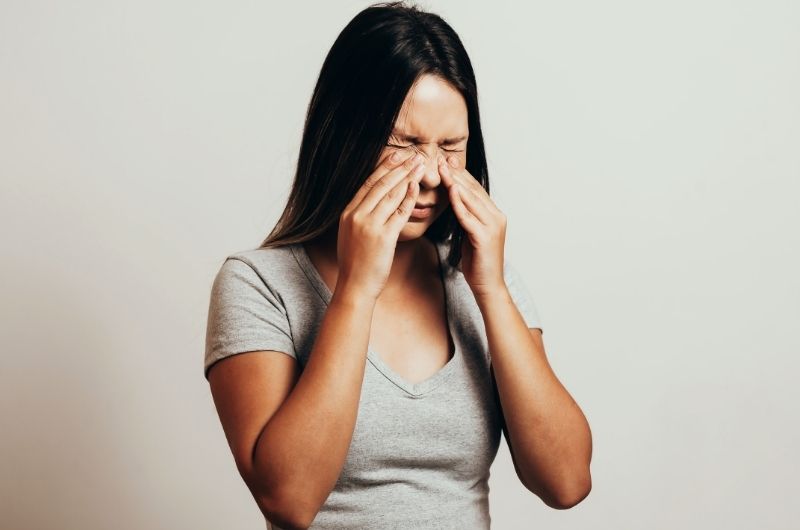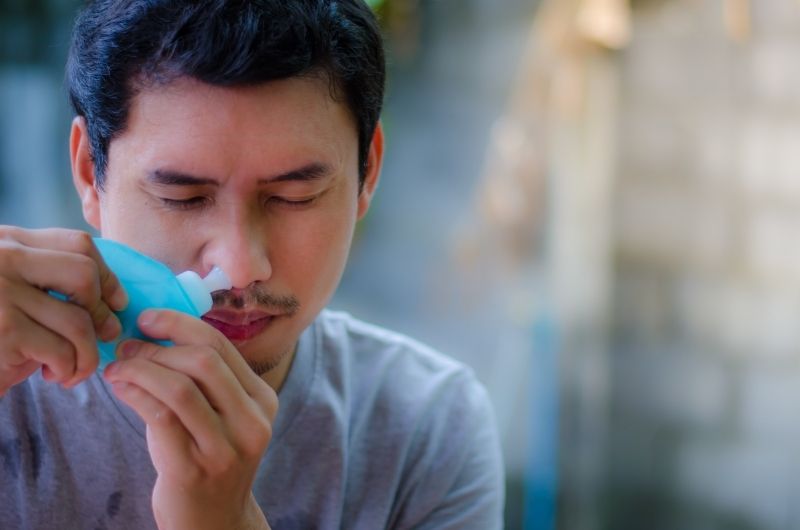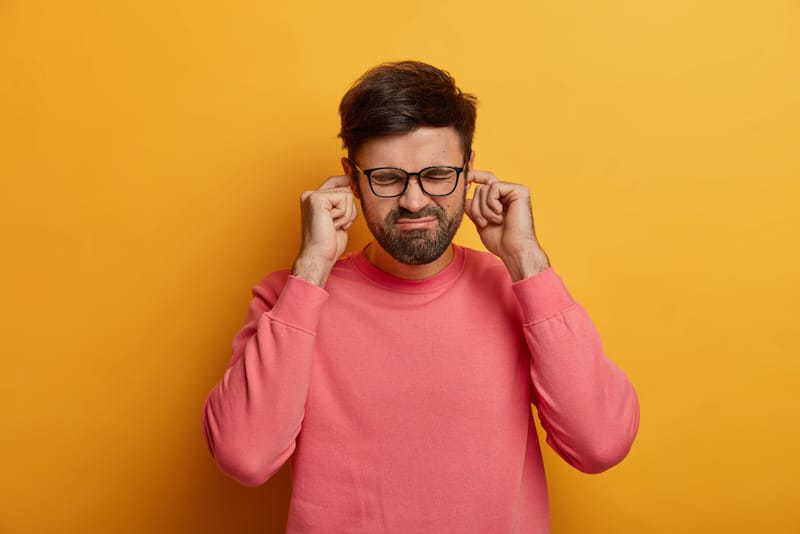Ear crackling after a sinus rinse is often because of fluid build-up in the eustachian tubes of your ear as you pour the saline solution into your nostril. These kinds of side effects are to be expected in nasal irrigation and the possibility of experiencing nose bleeds and minor headaches. However, the root cause of your ear crackle can be other conditions like the build-up of ear wax and Eustachian tube dysfunction. Despite what caused your ear to crackle, you should visit your doctor if this side-effect is accompanied by other symptoms like ear discharge or persisting headaches. When doing a sinus rinse, the primary considerations you should be aware of are using sterile water and positioning your head so that the solution doesn’t reach your throat. If you feel sinus rinsing isn’t for you, you can also replace it with other healthy alternatives like steaming, humidifiers, and warm showers.
A sinus rinse, also called nasal irrigation, is a personal hygiene practice of cleansing your nasal passages so that your breathing can be improved.
With the use of saline or saltwater, your nasal passages are rinsed in a way that flushes out all the mucus and debris from the nose.
While it may be confusing how you can feel a certain crackling in the ear after a sinus rinse, it does have a logical explanation; meaning there’s nothing for you to worry about unless the crackling persists for a prolonged period.
Why does your ear crackle after a sinus rinse? What are the pros and cons of sinus rinsing? Could there be other reasons for the crackling in your ear?
At what point should you visit your doctor for an ear crackle? How can you do a proper sinus rinse? Are there any alternatives to sinus rinsing?
Why does your ear crackle after a sinus rinse?
The crackling you hear just after a sinus rinse can result from how you practice your cleansing.
Most people who use an item known as the neti pot for their nasal rinse always complain of a certain discomfort they experience in their ears.

This is a result of fluid build-up in the eustachian tubes of your ear, which cause a change in the pressure. This pressure change that happens while you’re rinsing might give you the urge to pop your ears, hence the ear crackle.
This usually goes down after a while. However, if you experience high levels of discomfort after a sinus rinse, you should visit your doctor.
Using a neti pot too roughly can also make you cough up, as the fluid can quickly drain down along the back of your throat, eventually winding up in the wrong pipe.
The following table will help you understand the harms and risks you’ll be taking with a sinus rinse.
| Pros of sinus rinse | Cons of sinus rinse |
|---|---|
| Nasal cleansing – This pro is undeniable as the sole purpose of a sinus rinse is to eliminate irritating and infectious elements that end up in our nasal passages. | Interference with mucus – As our nasal mucus contains essential immune elements in fighting respiratory infections, cleansing it out, in the long run, can turn out to be counterproductive. |
| Relieves nasal congestion – Sinus rinsing helps thin out our mucus while improving the movement of our cilia, which helps get rid of bacteria. | Removal of nonharmful elements – Just as saline can remove harmful agents in our nose, it can also wash away beneficial antiviral, antifungal, and antibacterial agents. |
| Takes care of sinus – It’s a successful way of calming your sinus symptoms as any other traditional sinus treatment is | Side effects – Although sinus rinses are safe, certain regular users complain of side effects like nasal irritation, nosebleeds, and headaches. |
Could there be other reasons for crackling in your ear?
While ear crackling can be easily associated with sinus rinsing, sometimes this might not be the case, as ear crackling is also an identified symptom of various medical conditions.
The following list shall address such concerns:
- Eustachian tube dysfunction – Our eustachian tubes are responsible for maintaining pressure, draining fluid, and preventing infections in our middle ear. While these tubes usually stay closed, it opens up when you yawn, chew, or swallow. The dysfunction occurs when the tubes stop opening and closing accordingly, resulting in a crackling sound in your ear. You might also experience a feeling of congestion or pain in your ear, dizziness, and muffled hearing as other symptoms of this condition.
- Collection of earwax – Earwax plays the role of lubricating and protecting our ear canal. Sometimes earwax can get blocked in our ear canal, especially if we try using a cotton swab to get it out but instead push it deeper into the ear. This can cause a certain crackling in our ear and discomfort, itching, and partial hearing loss as our ear canal is blocked.
- Acute otitis media – This occurs when your middle ear gets infected. As the infection has narrowed the pathway in your eustachian tubes, you can feel your ear crackling and other symptoms like ear pain and difficulty hearing. Children might go through other symptoms like fever, difficulty falling asleep, and a low appetite.
- TMJ disorders – Your Temporomandibular joint, which connects your skull to your jawbone, can experience damage or erosion, leading to what’s known as TMJ disorders. You’ll feel a different type of crackling in your ear in such instances where the crackling seems to be closer to your ear and occurs whenever you open your mouth or chew something. You might also experience other symptoms like stiffness in your jaw muscles, limited movement of your jaw, and the locking down of your jaw.
At what point should you see your doctor for ear crackles after sinus rinse?
If you’re worried about the crackling sound after a sinus rinse and if the symptoms you’re experiencing don’t seem to fade away, it might be time to visit your doctor, even to simply clarify your doubts.
You need to be concerned about when your crackling begins to interrupt your day-to-day activities by making it difficult for you to hear and persisting to crackle after it’s been over 24 hours since your sinus rinse.
If you experience other symptoms, such as intense headaches, difficulties in moving your jaw, and feelings as if your nose or ears may be infected, you might need medical help.
Any extreme discomfort in your ear and ear discharge that might contain either blood or pus needs to be immediately communicated to your doctor before the infection spreads.
To properly come up with a diagnosis, a physical examination of your ears, nose, throat, and jaw will be taken for closer inspection.
How to do a proper sinus rinse?
Following a proper sinus-rinsing procedure is important to avoid side effects like ear crackling.

By abiding by the given steps below, you can correct any mistakes that have been previously made in your sinus rinsing.
- Make the solution – To make the saline solution, you’ll need to mix warm sterile water with pure salt, also known as sodium chloride, to concoct what’s known as an isotonic solution. It’s essential to use sterile water for this solution by boiling the water for a minute. If you use regular tap water, you might run the risk of infection that can enter your brain. You can simplify this process by purchasing premixed saline packaging from a pharmacy itself.
- Position yourself – After making the solution, you need to stand over your sink or even below your shower and tilt your head to one side.
- Pouring the solution – You can use a neti pot, bulb syringe, or even a squeeze bottle to drip out the solution gently into your upper nostril. Let the solution pour in from one nostril and out from the other into the sink. During this process, make sure you breathe through your mouth and not your nose.
- Repeat – Repeat this same process with your other side.
- Precaution – Tilt your head and squeeze the solution out so that the solution doesn’t make its way to the back of your throat. Try adjusting your head position until you find a comfortable position to follow this process.
- Tissue cleanup – After carrying out this process, lightly blow your nose into a tissue so that any remaining mucus may be removed.
Alternatives to sinus rinse for nasal congestion
The main reason why we choose sinus rinsing is to get rid of a stuffy, congested nose that makes us difficult to breathe. Sinus rinsing isn’t the only option to help us loosen our nasal passages.
The following list can be considered alternatives to sinus rinsing if you want to clear up your nose without running the risk of ear crackling.
- Steaming – Steam inhalation is a healthy and safe way of thinning out your mucus. A 2021 study conducted by the US National Library of Medicine concluded from observation that steam inhalation marked a significant improvement in nasal congestion of participants. You can easily do this by pouring boiling water into a large bowl, leaning into the bowl, and covering your head with a towel so that the steam gets trapped within the towel.
- Hot showers – The same effect as steaming can be experienced here as hot water emits steam, and you’ll be breathing in this warm air.
- Warm fluids – Try drinking a lot of warm liquids like hot soup. It can help loosen up your mucus.
- Humidifier or vaporizer – This will help moisturize the air around your home as dry air can worsen a congested nose. You can also try heated, humidified air for this purpose, as shown by a 2017 study.
- Wet towel – By placing a warm and damp towel across your face, you can receive some minor comfort by breathing it in.
- Avoid chlorinated pools – Try to stay away from swimming while having a nose block as almost all pools use chlorine which can irritate your nasal pathways. According to a 2018 study conducted by the US National Library of Medicine, acute chlorine exposure can develop acid mucus content in your nasal passage, thereby worsening your situation.
- Elevate – When you sleep at night, it’s best to keep your head elevated with the help of stacking up a few pillows. This will make breathing easier for you.
Conclusion
Ear crackling is common and can happen even without sinus rinsing due to earwax build-up in your ear.
While ear crackling even after nasal irrigation is a normal experience, the continuous crackling and discomfort that comes with it might hint at an underlying condition.
You can quickly sort out your doubts by visiting your doctor, who will carry out a physical examination and confirm any health concerns.
Meanwhile, it’s up to you to decide whether you should quit sinus rinsing and look for other options to keep your nose clean and uncongested.


